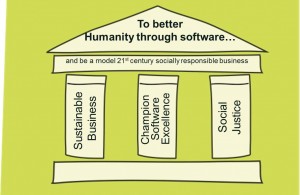Disclaimer: The statements and opinions expressed in this article are those of the author(s) and do not necessarily reflect the positions of Thoughtworks.

We often compartmentalize our lives—work goes here, politics goes there, social responsibility goes somewhere else. This compartmentalization is often schizophrenic, but seemingly necessary in organizational life. But is it, necessary that is?
There are a growing number of companies that help people integrate these multiple facets of their lives—companies like Ben & Jerry’s, and yes, like Thoughtworks.
This integration of product, economic, and social components creates a specific culture in organizations, one that contributes to, and actually defines organizational health. It raises the question, “Is organizational health important to success?”
Organizations that focused on performance and health simultaneously were nearly twice as successful as those that focused on health alone, and nearly three times as successful as those that focused on performance alone.
This quote, and in fact the entire book, Beyond Performance: How Great Organizations Build Ultimate Competitive Advantage, by Scott Keller & Colin Price (McKinsey & Co.) builds a case for the importance of organizational health as key to building high performance results.

In Drive The Surprising Truth About What Motivates Us, Daniel Pink stresses three components of engaging employees are autonomy, mastery and purpose. Do companies want to make money in order to further their existence (certainly the historical case) or do they have a purpose, a raison détre, that making money helps them achieve? Facebook’s purpose, for example, is stated as “To make the world more open and connected,” not to make money. Wall Street often sees things differently, but in the future battle for customers and talent (the critical dimensions of competitiveness), purpose draws talent—and keeps those talented individuals engaged. People want to work for companies who care about more than just making money. Money is a satisfier, not a motivator—at least for a growing number of us.
Ben and Jerry’s, for example, has a 3-part mission statement:
As part of their social mission, Ben & Jerry’s web site voices support of the Occupy Movement.
Thoughtworks’s mission is “nothing less than to better humanity through software,” and is founded on Three Pillars:
Providing software engineering training for Ugandan students is an example of how Thoughtworks combines pillars 2 and 3. Some individuals won’t agree with, or like, Ben & Jerry’s stand on issues. Some may not agree with, or like, the organizations or causes that Thoughtworks supports. But they may find other organizations who take stands that they can relate to and agree with. The point is that as companies, organizations, and individuals we shouldn’t have to separate our visions of social and economic justice from our business and professional lives. Integrating the two is good for personal satisfaction, it’s good for company performance, and it makes the world a better place for all.
This post is from Adaptive Imagineering by Jim Highsmith. Click here to see the original post in full.
Disclaimer: The statements and opinions expressed in this article are those of the author(s) and do not necessarily reflect the positions of Thoughtworks.
